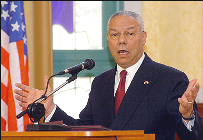Darfur troop intervention talk is premature – U.S.
By Nima Elbagir
KHARTOUM, July 27 (Reuters) – U.S. Secretary of State Colin Powell said on Tuesday it was premature to discuss military intervention in Sudan’s troubled Darfur region, while Khartoum warned it would retaliate if foreign troops entered the country.
 In a rare insight into events in the remote, arid western region, African Union ceasefire monitors said in a document seen by Reuters that shackled villagers had been burned alive in an attack believed to have been carried out by Arab militiamen.
In a rare insight into events in the remote, arid western region, African Union ceasefire monitors said in a document seen by Reuters that shackled villagers had been burned alive in an attack believed to have been carried out by Arab militiamen.
The observers said a fact-finding team concluded the attackers had “killed civilians, in some cases by chaining them and burning them alive” in the village of Suleia on July 3.
Powell said the international community still had other ways to influence Khartoum, including a U.S.-drafted United Nations Security Council resolution to tackle what the U.N. calls the world’s worst humanitarian crisis.
“Some nations have gone farther and started to talk about other action of a military nature but I think that’s premature,” Powell told reporters on a flight from Budapest to Cairo.
Britain and Australia have said they might send troops to Darfur, where rebels accuse Khartoum of backing Arab militias, also known as Janjaweed, in an ethnic cleansing campaign against black Africans. The U.S. Congress has branded it genocide.
U.S. THREATENS SANCTIONS
Washington broadened its resolution to threaten sanctions against Khartoum if it did not disarm the militias as well as prosecute their leaders over the conflict that the U.N. says has displaced around 1.5 million people and killed about 30,000.
U.S. representative Stuart Holliday said he had told Security Council members to expect a vote “either Thursday or Friday” after further discussions among ambassadors.
China, which has veto powers, and Islamic nations Pakistan and Algeria oppose any reference to sanctions.
So far no country has said it will send troops to Darfur and no U.N. decision has been made on any peacekeeping force.
“If we are attacked we will not sit silent, we will retaliate … but we definitely hope we do not reach that situation,” Sudanese Foreign Minister Mustafa Osman Ismail told a news conference during a visit to Turkey.
Ismail blamed the rebels for the violence in Darfur.
“Sudan never started this war … But we admit the government is responsible for bringing back law and order, for disarming the militias,” said Ismail, whose government says it is making progress on security and aid in Darfur.
REBELS CALL FOR FOREIGN TROOPS
Rebels repeated calls for Washington, the European Union and the African Union (AU) to send in troops to protect civilians.
The Sudan Liberation Movement (SLM), one of the two main rebel groups, said it was ready to start peace talks if Khartoum pursued them as seriously as it had efforts to end a separate conflict with rebels in the south of Africa’s largest country.
The rebels says the government arms the militias, a charge denied by Khartoum, and both sides have accused each other of violating a ceasefire agreed in April.
“I am calling on the U.S., United Nations, EU and AU to send as early as possible troops to guarantee assistance (to civilians) because the government and militia are carrying out a policy of ethnic cleansing,” SLM chairman Abd-al Wahid Muhammad Ahmad Nurhe said from neighbouring Eritrea.
Khartoum’s AU envoy, Ousman Alsaid, accused Washington of trying to topple his government because it did not like Sudan’s policies, which include an anti-American stance on prominent Arab issues such as Iraq and the Israeli-Palestinian conflict.
“The U.S. government is using the crisis in Darfur to bring down the government of Sudan,” he said on the sidelines of a meeting of the AU’s peace and security council in Addis Ababa.
Alsaid said Western military intervention could fragment oil-producing Sudan and destabilise neighbouring countries.
AID WORKERS ISSUE WARNING
Aid workers say the world must do much more to stop refugees from dying. Some refugees have fled to neighbouring Chad.
Sudan said it would free Islamist opposition leader Hassan al-Turabi, jailed in March for inciting rebels in Darfur, as soon as possible, but gave no other details about the decision.
Turabi, 72, once a powerful figure in President Omar Hassan al-Bashir’s government, was taken to hospital on Sunday after eating nothing but dates to protest against his detention.
Agriculture Minister Majzoub al-Khalifa Ahmed said Turabi would be freed along with other members of the opposition Popular Congress and that meetings would be held with opposition and civil society groups in an effort to promote national unity.
(Additional reporting by Gareth Jones in Ankara, Andrew Gray in Ablouc, Chad, Aine Gallagher in Brussels, Tsegaye Tadesse in Addis Ababa and Katie Nguyen in Nairobi)
